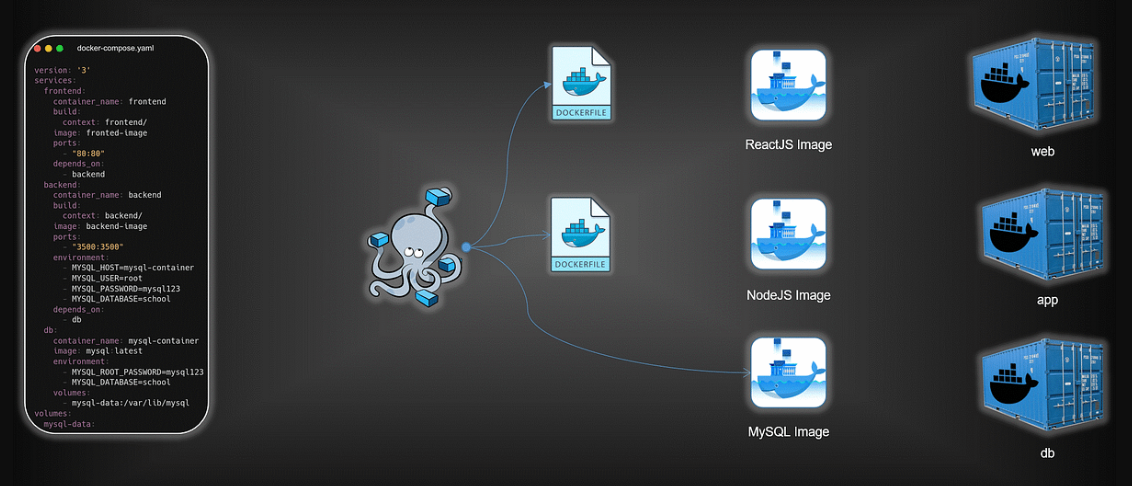Introduction
Deploying a full-stack application, like the MERN stack (MongoDB, Express.js, React, Node.js), can be challenging without the right tools for managing environments and scaling. Docker and Kubernetes have emerged as powerful technologies that simplify and enhance the deployment process. Docker enables developers to package and run applications in isolated containers, ensuring consistency across systems. Meanwhile, Kubernetes automates the orchestration, scaling, and management of these containers, making it ideal for complex, distributed applications. Together, Docker and Kubernetes provide a robust solution for deploying, managing, and scaling MERN stack applications in modern, cloud-native environments. Refer to the MERN Stack Course with Placement for more information.
What Is MERN Stack?
The MERN stack is a popular web development framework that consists of four main technologies: MongoDB, Express.js, React, and Node.js. It enables developers to build full-stack JavaScript applications, as all components use JavaScript for both client-side and server-side development.
- MongoDB: A NoSQL database where data is stored in flexible, JSON-like documents.
- js: A lightweight web application framework for Node.js that handles routing and server-side logic.
- React: A front-end library for building user interfaces, primarily for single-page applications.
- js: A JavaScript runtime that allows developers to run JavaScript on the server side.
Together, these technologies streamline the development process, offering a unified language (JavaScript) across the entire application, making it easier to build fast and scalable web applications.
Overview Of Docker And Kubernetes
Docker and Kubernetes are key tools in modern DevOps practices, often used together to improve software deployment, scaling, and management.
Docker
Docker is a platform for developing, shipping, and running applications inside containers. Containers are lightweight, standalone, and executable packages that include everything needed to run an application, such as code, runtime, libraries, and dependencies. Docker helps standardize the environment, ensuring that applications run consistently across various systems.
Key benefits of Docker include:
- Portability: Applications packaged in containers can run anywhere Docker is supported.
- Efficiency: Containers use fewer resources than traditional virtual machines because they share the host’s OS kernel.
- Isolation: Each container runs independently, ensuring stability and security.
Kubernetes
Kubernetes, often abbreviated as K8s, is an open-source container orchestration platform that automates the deployment, scaling, and management of containerized applications. While Docker focuses on creating and running containers, Kubernetes manages clusters of containers across multiple hosts.
Key features include:
- Automated Scaling: Kubernetes can scale up or down based on traffic and demand.
- Self-healing: Automatically restarts failed containers and replaces or kills those that do not respond.
- Load Balancing: Distributes network traffic to ensure application stability.
By combining Docker’s containerization with Kubernetes’ orchestration capabilities, developers and organizations can achieve more efficient, scalable, and resilient software infrastructures, especially in cloud-native environments.
MERN Stack Deployment Strategies With Docker And Kubernetes
Deploying the MERN stack (MongoDB, Express.js, React, Node.js) using Docker and Kubernetes can significantly enhance the scalability, portability, and manageability of applications. Many Mern Stack Interview Questions include questions on MERN deployment with Docker and Kubernetes, thereby, making it an important topic for MERN professionals.
Here’s an overview of key deployment strategies for a MERN stack using these technologies:
1. Dockerizing the MERN Stack
Each part of the MERN stack is containerized to ensure consistency across development, testing, and production environments.
- React (Front-end): A Docker container is created for the React app, serving static files.
- js and Express (Back-end): Another container hosts the Node.js runtime and Express server. It handles the API and server-side logic.
- MongoDB (Database): MongoDB runs in a separate container, storing the application’s data.
Steps to Dockerize:
- Create a Dockerfile for each service (React, Node.js, MongoDB).
- Use Docker Compose (docker-compose.yml) to define and manage multi-container applications, allowing communication between containers (React <-> Node.js <-> MongoDB).
2. Kubernetes for Orchestration
While Docker containers the application components, Kubernetes manages container orchestration for efficient deployment, scaling, and monitoring.
Key Kubernetes Components:
- Pods: Each component of the MERN stack is deployed in separate pods (e.g., MongoDB pod, Node.js pod, React pod).
- Services: Kubernetes services manage networking and allow pods to communicate (e.g., a service to expose the Node.js API).
- Deployments: Use Kubernetes deployments to manage the lifecycle of your applications, including scaling up/down and rolling updates.
- Persistent Volumes: For MongoDB, persistent volumes are used to ensure data is retained even if pods are destroyed.
Deployment Flow:
- Create Docker images for the MERN stack services.
- Define Kubernetes YAML files for pods, services, and deployments.
- Deploy the application using kubectl, ensuring autoscaling and self-healing capabilities.
This strategy offers scalability, fault tolerance, and simplified management, making it ideal for cloud-native MERN applications. Consider joining the MERN Stack Certification for the best guidance.
Conclusion
Deploying the MERN stack using Docker and Kubernetes offers significant advantages in terms of scalability, portability, and management. Docker ensures consistency across different environments by containerizing the application components, while Kubernetes automates the orchestration, scaling, and monitoring of these containers. Together, they streamline the deployment process, making it easier to manage large, complex applications. This approach is particularly well-suited for cloud-native applications, ensuring high availability, fault tolerance, and flexibility to handle dynamic traffic. By leveraging Docker and Kubernetes, development teams can achieve efficient, reliable, and scalable MERN stack deployments in modern DevOps environments.
